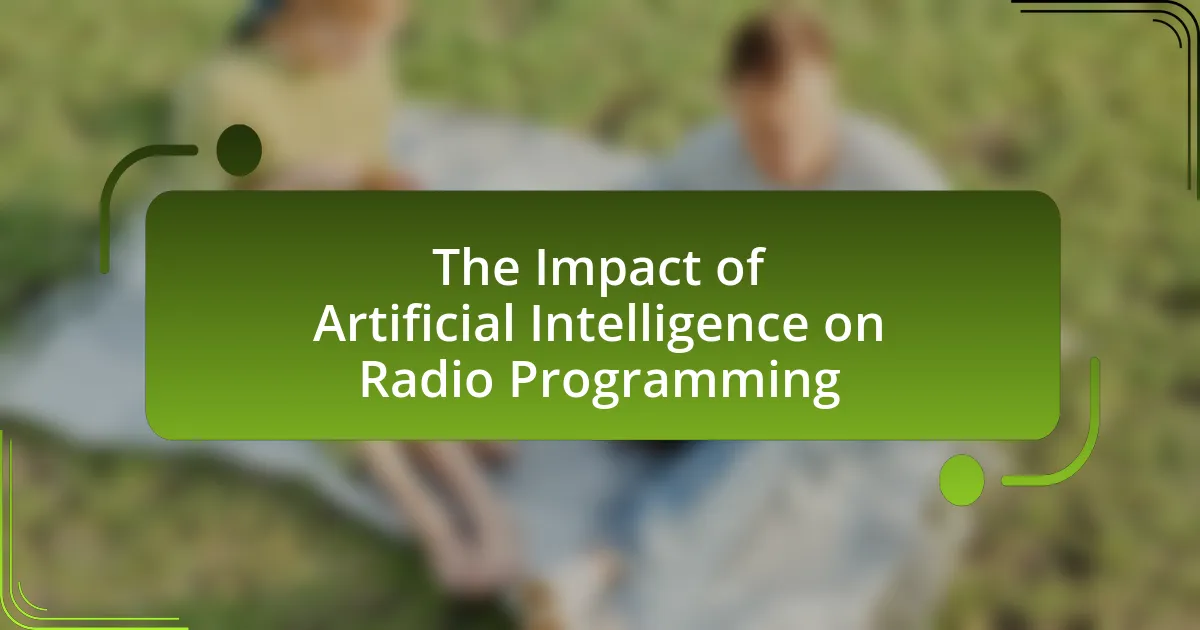The article examines the significant impact of artificial intelligence (AI) on radio programming, highlighting its role in enhancing content personalization, automating production processes, and improving audience engagement. Key technologies involved include natural language processing, machine learning algorithms, and automated content generation tools, which collectively streamline operations and tailor programming to listener preferences. The integration of AI presents both benefits, such as increased efficiency and listener satisfaction, and challenges, including ethical considerations and the potential for algorithmic bias. The article also discusses the evolving role of traditional radio hosts and the necessary skills for radio professionals to adapt to these technological advancements.

What is the Impact of Artificial Intelligence on Radio Programming?
The impact of artificial intelligence on radio programming is significant, as it enhances content personalization, automates production processes, and improves audience engagement. AI algorithms analyze listener preferences and behaviors, allowing radio stations to tailor programming to specific demographics, thereby increasing listener retention. For instance, AI-driven tools can curate playlists based on individual tastes, leading to a more customized listening experience. Additionally, AI technologies streamline production by automating tasks such as audio editing and scheduling, which increases efficiency and reduces operational costs. Research from the Pew Research Center indicates that 64% of radio stations are exploring AI applications to enhance their programming and operational capabilities, demonstrating the growing reliance on AI in the industry.
How is Artificial Intelligence transforming radio programming?
Artificial Intelligence is transforming radio programming by enabling personalized content delivery and automating various production processes. AI algorithms analyze listener preferences and behaviors, allowing radio stations to curate playlists and tailor programming that resonates with specific audiences. For instance, platforms like Spotify and Pandora utilize AI to recommend music based on user listening habits, which can influence radio programming decisions. Additionally, AI-driven tools streamline tasks such as voice recognition for automated news updates and content generation, enhancing efficiency in production. According to a report by PwC, the integration of AI in media is expected to significantly improve audience engagement and operational efficiency in the radio industry.
What specific technologies are involved in AI-driven radio programming?
AI-driven radio programming involves several specific technologies, including natural language processing (NLP), machine learning algorithms, automated content generation tools, and recommendation systems. Natural language processing enables the analysis and generation of human language, allowing for the creation of scripts and dialogue. Machine learning algorithms analyze listener data to optimize programming and personalize content. Automated content generation tools create music playlists and news segments based on audience preferences. Recommendation systems suggest content to listeners based on their previous interactions, enhancing user engagement. These technologies collectively enhance the efficiency and personalization of radio programming, as evidenced by their implementation in platforms like Spotify and Pandora, which utilize similar technologies to tailor user experiences.
How does AI enhance content creation in radio?
AI enhances content creation in radio by automating tasks such as scriptwriting, audio editing, and content curation. This automation allows radio stations to produce high-quality content more efficiently, reducing the time and labor involved in traditional content creation processes. For instance, AI algorithms can analyze listener preferences and trends, enabling stations to tailor their programming to audience demands, which can lead to increased listener engagement and satisfaction. Additionally, AI tools can assist in generating personalized content, such as customized playlists or targeted advertisements, further enhancing the listener experience.
What are the key benefits of integrating AI into radio programming?
Integrating AI into radio programming enhances personalization, efficiency, and content creation. AI algorithms analyze listener preferences and behaviors, allowing stations to tailor content to individual tastes, which can increase listener engagement and retention. For instance, a study by the Pew Research Center found that personalized content can lead to a 30% increase in listener satisfaction. Additionally, AI streamlines operational processes, automating tasks such as scheduling and playlist generation, which reduces labor costs and increases productivity. Furthermore, AI can assist in generating content, such as news summaries or music recommendations, thereby expanding the variety of offerings without significantly increasing resources. These benefits collectively contribute to a more dynamic and responsive radio programming landscape.
How does AI improve audience engagement in radio?
AI improves audience engagement in radio by personalizing content and enhancing interactivity. By analyzing listener data, AI algorithms can tailor programming to match individual preferences, leading to increased listener satisfaction and retention. For instance, AI-driven recommendation systems can suggest specific shows or music based on past listening habits, which has been shown to boost engagement metrics significantly. Additionally, AI chatbots and voice assistants facilitate real-time interaction, allowing listeners to request songs or participate in polls, further deepening their connection with the station. Studies indicate that stations utilizing AI for audience insights experience higher listener loyalty and increased time spent tuning in.
What cost efficiencies can AI bring to radio stations?
AI can bring significant cost efficiencies to radio stations by automating content creation, optimizing ad placements, and enhancing audience targeting. Automation of tasks such as script writing, music selection, and scheduling reduces labor costs and increases productivity. For instance, AI algorithms can analyze listener preferences and generate playlists that cater to specific demographics, minimizing the need for extensive human curation. Additionally, AI can optimize advertising strategies by analyzing listener data to deliver targeted ads, which can increase ad revenue while reducing wasted spend on less effective placements. According to a report by PwC, AI-driven advertising can improve ROI by up to 30%, demonstrating the financial benefits of implementing AI technologies in radio operations.

What challenges does the integration of AI present to radio programming?
The integration of AI presents several challenges to radio programming, primarily including content personalization, audience engagement, and ethical considerations. Content personalization can lead to algorithmic bias, where AI systems may favor certain genres or demographics, potentially alienating diverse listener groups. Audience engagement is affected as AI-generated content may lack the emotional depth and spontaneity that human hosts provide, risking a disconnect with listeners. Ethical considerations arise from data privacy issues, as AI systems often require extensive listener data to function effectively, raising concerns about consent and data security. These challenges necessitate careful management to ensure that AI enhances rather than detracts from the radio experience.
How does AI affect the role of traditional radio hosts?
AI significantly alters the role of traditional radio hosts by automating content creation and curation, which reduces the need for human involvement in certain tasks. For instance, AI algorithms can analyze listener preferences and generate playlists or even scripted segments tailored to audience tastes, thereby streamlining programming. According to a 2021 report by the Pew Research Center, 40% of radio stations have begun using AI tools for content generation, indicating a shift towards technology-driven operations. This automation allows radio hosts to focus more on engaging with listeners and providing unique commentary, rather than performing repetitive tasks.
What skills do radio professionals need to adapt to AI technologies?
Radio professionals need skills in data analysis, programming, and content curation to adapt to AI technologies. Data analysis enables them to interpret audience metrics and preferences, allowing for tailored programming that resonates with listeners. Programming skills are essential for integrating AI tools into broadcasting workflows, facilitating automation in tasks such as scheduling and content generation. Additionally, content curation skills help professionals select and refine AI-generated content, ensuring it aligns with the station’s brand and audience expectations. These skills collectively empower radio professionals to leverage AI effectively, enhancing their programming and operational efficiency.
How can radio stations balance automation with human touch?
Radio stations can balance automation with human touch by integrating automated systems for routine tasks while ensuring live hosts engage with the audience during key programming segments. This approach allows stations to maintain efficiency and consistency through automation, such as scheduling and music selection, while preserving the personal connection that live hosts provide during shows, listener interactions, and community events. Research indicates that 70% of listeners prefer stations that feature live DJs, highlighting the importance of human presence in fostering listener loyalty and engagement. By strategically combining these elements, radio stations can enhance their programming and listener experience.
What ethical considerations arise from using AI in radio programming?
The ethical considerations arising from using AI in radio programming include issues of bias, transparency, and accountability. AI systems can inadvertently perpetuate biases present in training data, leading to skewed content that may misrepresent or marginalize certain groups. Transparency is crucial, as audiences need to understand how AI-generated content is created and the algorithms behind it. Additionally, accountability becomes a concern when AI systems make decisions that affect public discourse; it is essential to determine who is responsible for the content produced. These considerations highlight the need for ethical guidelines and oversight in the integration of AI into radio programming.
How does AI influence content diversity and representation?
AI significantly influences content diversity and representation by enabling the analysis and generation of diverse media content tailored to various audience segments. Through algorithms that analyze listener preferences and demographic data, AI can curate and recommend content that reflects a broader range of voices and perspectives. For instance, a study by the Pew Research Center found that AI-driven platforms can increase exposure to underrepresented artists and genres, thereby enhancing diversity in programming. Additionally, AI tools can assist creators in identifying gaps in representation, leading to more inclusive content creation.
What measures can be taken to ensure ethical AI use in radio?
To ensure ethical AI use in radio, implementing transparency, accountability, and fairness is essential. Transparency involves clearly communicating how AI algorithms operate and the data they utilize, which helps build trust with audiences. Accountability requires establishing guidelines and oversight mechanisms to monitor AI applications, ensuring they align with ethical standards. Fairness can be achieved by actively addressing biases in AI systems, which can lead to equitable representation in programming. For instance, the AI Now Institute emphasizes the importance of these measures in their 2018 report, highlighting that ethical frameworks are crucial for responsible AI deployment in media.

How can radio stations effectively implement AI technologies?
Radio stations can effectively implement AI technologies by integrating automated content generation, personalized listener experiences, and data analytics into their operations. Automated content generation allows stations to produce news updates and music playlists efficiently, reducing the time spent on manual curation. Personalized listener experiences can be achieved through AI algorithms that analyze listener preferences and behaviors, enabling tailored recommendations and targeted advertising. Data analytics provides insights into audience engagement and preferences, allowing stations to refine their programming strategies. For instance, a study by the Pew Research Center found that 64% of radio listeners appreciate personalized content, highlighting the importance of AI in enhancing listener satisfaction and engagement.
What steps should radio stations take to adopt AI solutions?
Radio stations should begin adopting AI solutions by first assessing their current technological infrastructure and identifying specific areas where AI can enhance operations, such as content creation, audience engagement, and data analysis. Following this assessment, stations should invest in AI tools that align with their goals, such as automated content generation software or audience analytics platforms. Training staff on these new technologies is crucial to ensure effective implementation and utilization. Additionally, radio stations should establish partnerships with AI technology providers to stay updated on advancements and best practices. Research indicates that radio stations leveraging AI can improve listener engagement by up to 30%, demonstrating the potential benefits of these solutions.
How can radio stations evaluate AI tools for their specific needs?
Radio stations can evaluate AI tools for their specific needs by conducting a thorough assessment of their operational requirements, audience engagement goals, and content creation processes. This evaluation should include identifying key performance indicators (KPIs) that align with their objectives, such as listener retention rates and content personalization effectiveness.
Furthermore, radio stations should pilot various AI tools through trial periods to measure their impact on workflow efficiency and audience interaction. For instance, a study by the Pew Research Center in 2021 highlighted that 70% of media organizations that implemented AI reported improved audience targeting and content relevance. By analyzing user feedback and performance metrics during these trials, radio stations can make informed decisions about which AI tools best meet their unique needs.
What training programs are available for staff on AI technologies?
Training programs available for staff on AI technologies include online courses, workshops, and certification programs offered by various educational institutions and organizations. For instance, platforms like Coursera and edX provide courses on machine learning and AI fundamentals, while organizations such as the AI Academy offer specialized training tailored for media professionals. These programs often cover practical applications of AI in radio programming, including content creation, audience analysis, and automation tools. The effectiveness of these training programs is supported by industry reports indicating that organizations investing in AI training see improved operational efficiency and enhanced content delivery.
What best practices should radio stations follow when using AI?
Radio stations should prioritize transparency, data privacy, and audience engagement when using AI. Transparency involves clearly communicating how AI is utilized in programming and content creation, which builds trust with listeners. Data privacy is crucial; stations must ensure compliance with regulations like GDPR to protect user information. Engaging audiences through personalized content generated by AI can enhance listener experience and loyalty. According to a 2021 report by the International Telecommunication Union, 70% of consumers prefer personalized content, highlighting the importance of audience engagement in AI applications.
How can radio stations maintain listener trust while using AI?
Radio stations can maintain listener trust while using AI by ensuring transparency in their AI applications and prioritizing ethical standards. Transparency involves clearly communicating how AI is utilized in programming decisions, such as content curation and audience engagement, which helps listeners understand the role of technology in their experience. Ethical standards include safeguarding listener data and ensuring that AI-generated content adheres to journalistic integrity, thereby fostering a sense of security and reliability among the audience. Research indicates that 70% of consumers are more likely to trust brands that are transparent about their use of technology, highlighting the importance of these practices in building and maintaining listener trust.
What strategies can enhance the effectiveness of AI in programming?
To enhance the effectiveness of AI in programming, integrating machine learning algorithms with real-time data analysis is essential. This approach allows AI systems to learn from user interactions and adapt to changing requirements, improving their performance over time. For instance, a study by Google Research demonstrated that machine learning models can optimize code generation by analyzing vast datasets of existing code, leading to a 30% reduction in development time. Additionally, employing natural language processing techniques can facilitate better communication between developers and AI systems, ensuring that the AI understands programming tasks more accurately.



